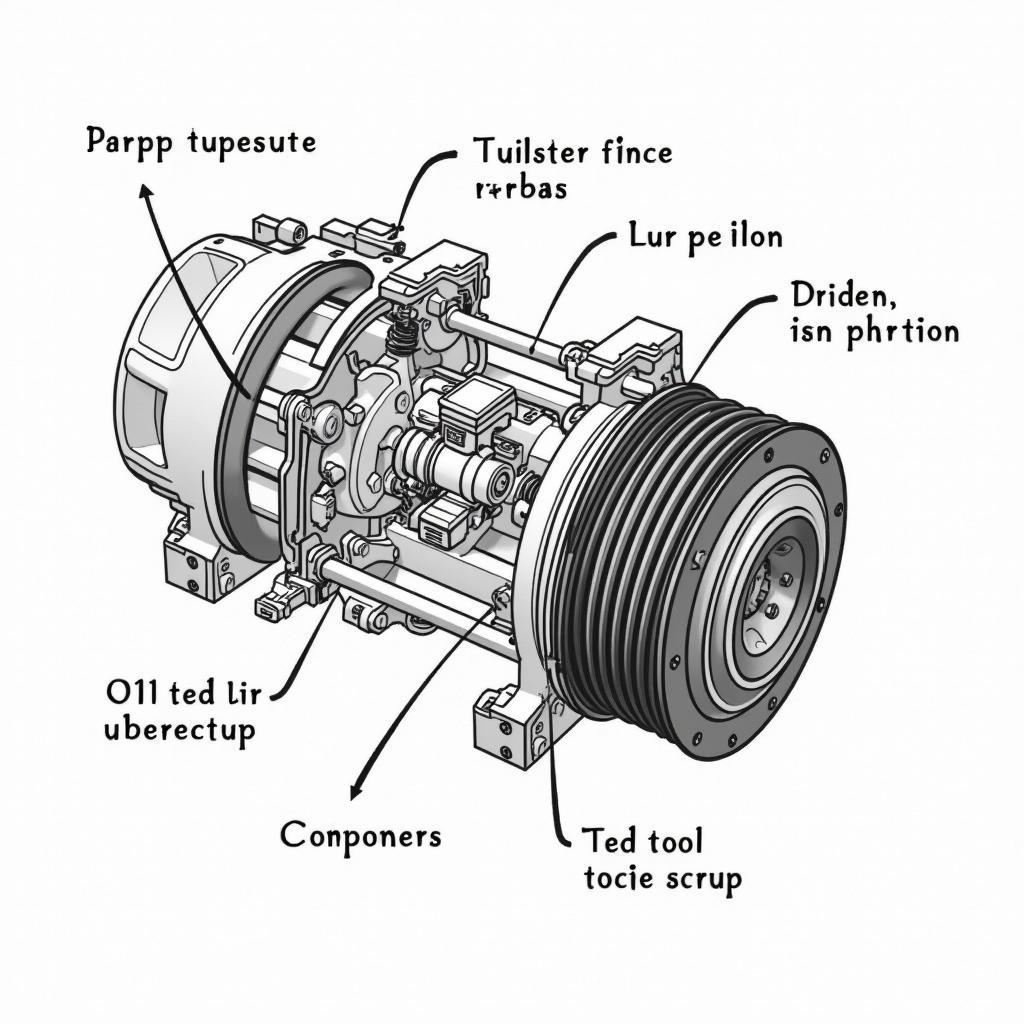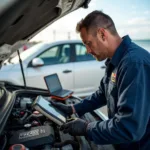When your car’s AC starts blowing hot air, it can be a real buzzkill, especially on a scorching summer day. One of the most vital components of your car’s air conditioning system is the compressor. A malfunctioning compressor can render your AC useless, leaving you sweating in frustration. This comprehensive guide delves deep into the intricacies of car air conditioning compressor repair, equipping you with the knowledge to make informed decisions about your vehicle’s cooling system.
Understanding the Car AC Compressor
The AC compressor is the heart of your vehicle’s air conditioning system. It’s responsible for pressurizing and circulating refrigerant, a special fluid that absorbs heat from the passenger cabin. Think of it as the pump that keeps the cooling cycle going.
The compressor itself is a complex piece of machinery, consisting of several moving parts working in unison. When the compressor is engaged, it compresses the refrigerant vapor, raising its temperature and pressure. This hot, high-pressure vapor is then pushed through the condenser, where it releases heat and condenses into a high-pressure liquid. This liquid refrigerant flows through the rest of the system, eventually evaporating back into a gas and absorbing heat from the air, thus cooling your car.
Common Signs of AC Compressor Failure
Identifying a failing AC compressor early on can save you from a complete breakdown and potentially costly repairs. Here are some telltale signs to watch out for:
- Warm air blowing from the vents: This is the most obvious sign. If your AC is on but only blows warm air, there’s a high chance the compressor isn’t functioning properly.
- Loud noises when the AC is on: A failing compressor can produce a variety of noises, such as grinding, squealing, or clicking. These noises usually originate from the front of the engine bay.
- AC clutch not engaging: The AC compressor is engaged by a clutch. If the clutch fails, the compressor won’t turn on, and your AC won’t blow cold air.
- Refrigerant leaks: A leak in the AC system can cause the compressor to work harder and eventually fail.
What Causes an AC Compressor to Fail?
AC compressor failure can stem from various factors, ranging from normal wear and tear to more serious mechanical problems. Here are some of the most common culprits:
- Age and mileage: Like any other mechanical component, AC compressors have a limited lifespan. As your car ages and accumulates mileage, the compressor naturally wears down, making it more susceptible to failure.
- Lack of use: Ironically, not using your car’s AC system regularly can also lead to problems. When the system sits idle for extended periods, seals can dry out, and refrigerant can leak out.
- Contaminated refrigerant: Over time, dirt, debris, and moisture can contaminate the refrigerant, reducing its effectiveness and potentially damaging the compressor.
- Electrical issues: Electrical problems, such as a faulty AC relay or a blown fuse, can prevent the compressor from receiving the power it needs to function.
Car Air Conditioning Compressor Repair Options
If you suspect your car’s AC compressor is on its last legs, it’s crucial to have it inspected by a qualified mechanic as soon as possible. Depending on the severity of the problem, there are a few repair options available:
- Compressor replacement: In many cases, the most cost-effective solution is to replace the entire compressor with a new or remanufactured unit.
- Compressor rebuild: If the damage to the compressor is not too severe, it may be possible to rebuild it by replacing worn-out components.
- System flush: If the refrigerant is contaminated, a system flush may be necessary to remove the impurities and prevent further damage to the compressor.
The Importance of Regular AC Maintenance
Preventing AC compressor problems is always preferable to dealing with a breakdown. Regular maintenance can significantly extend the life of your car’s AC system and save you money in the long run. Here are some essential maintenance tips:
- Schedule annual AC inspections: Have your car’s AC system inspected by a qualified mechanic at least once a year, preferably in the spring before the hot weather hits.
- Run your AC regularly: Even during the colder months, it’s a good idea to run your AC for a few minutes every couple of weeks to keep the system lubricated and prevent seals from drying out.
- Check for leaks: Inspect your car’s AC system regularly for any signs of refrigerant leaks, such as oily residue around the compressor or hoses.
Finding Reliable Car Air Conditioning Compressor Repair Near You
When it comes to your car’s AC system, it’s crucial to entrust the repairs to experienced and reputable professionals. For top-notch car air conditioning compressor repair services, consider these options:
- Car air conditioning repair Ponchatoula LA: Serving the Ponchatoula area, these experts provide reliable AC repair and maintenance services.
- Car air conditioning repair Mesa AZ: Located in Mesa, this repair shop offers comprehensive AC diagnostics and repair solutions.
Keeping Your Cool
A properly functioning car AC system is essential for a comfortable and enjoyable driving experience, especially during the sweltering summer months. By understanding the role of the AC compressor and the common signs of failure, you can address potential issues promptly and keep your cool on the road. Remember, regular maintenance and timely repairs are key to prolonging the life of your car’s AC system and ensuring optimal performance.



